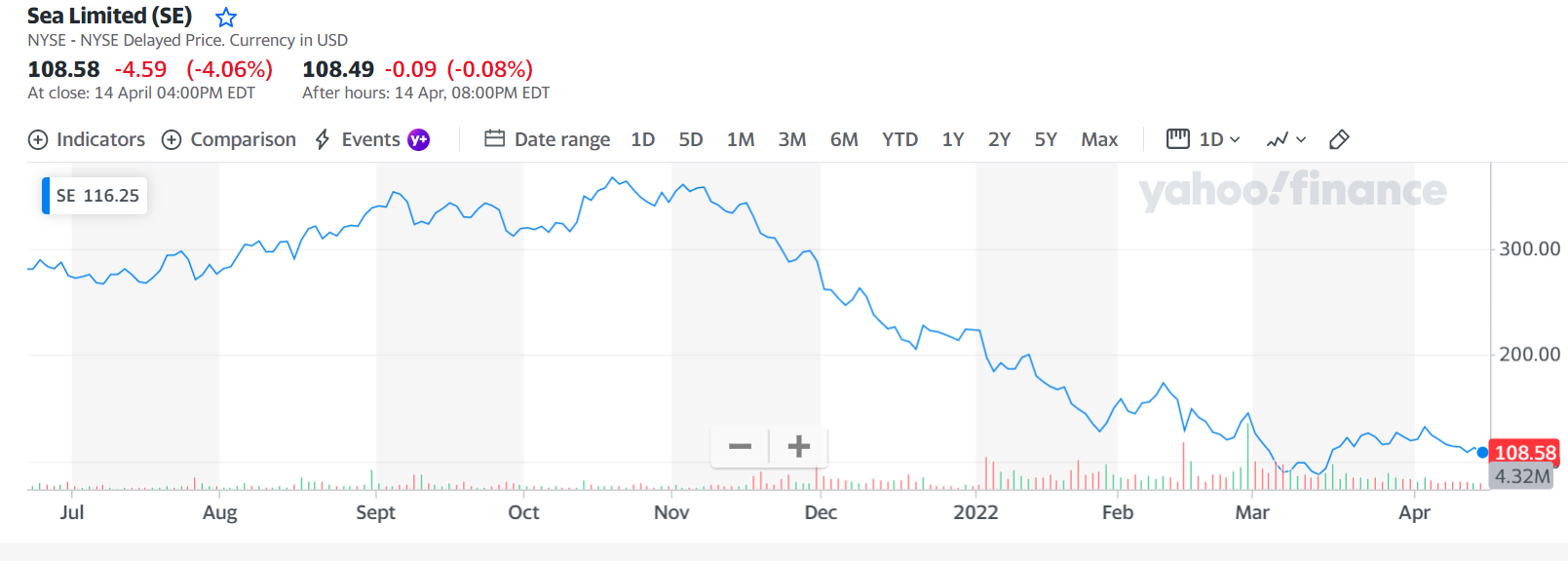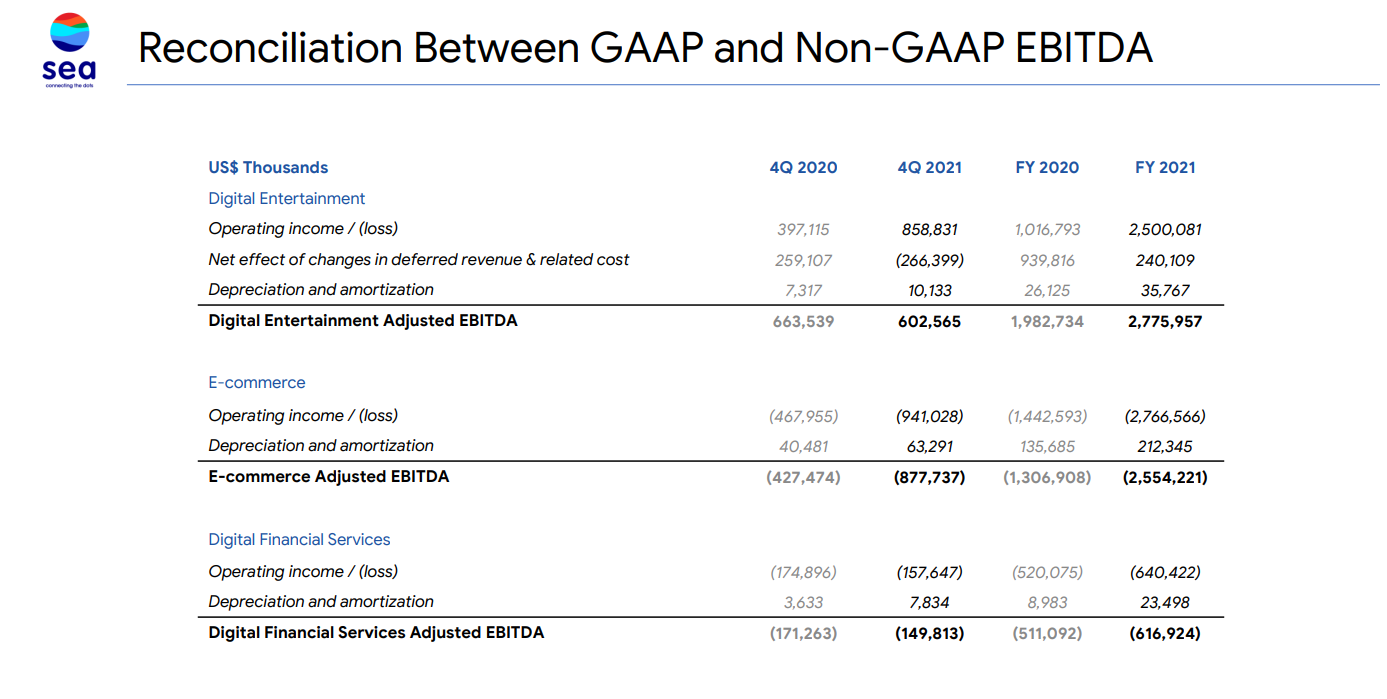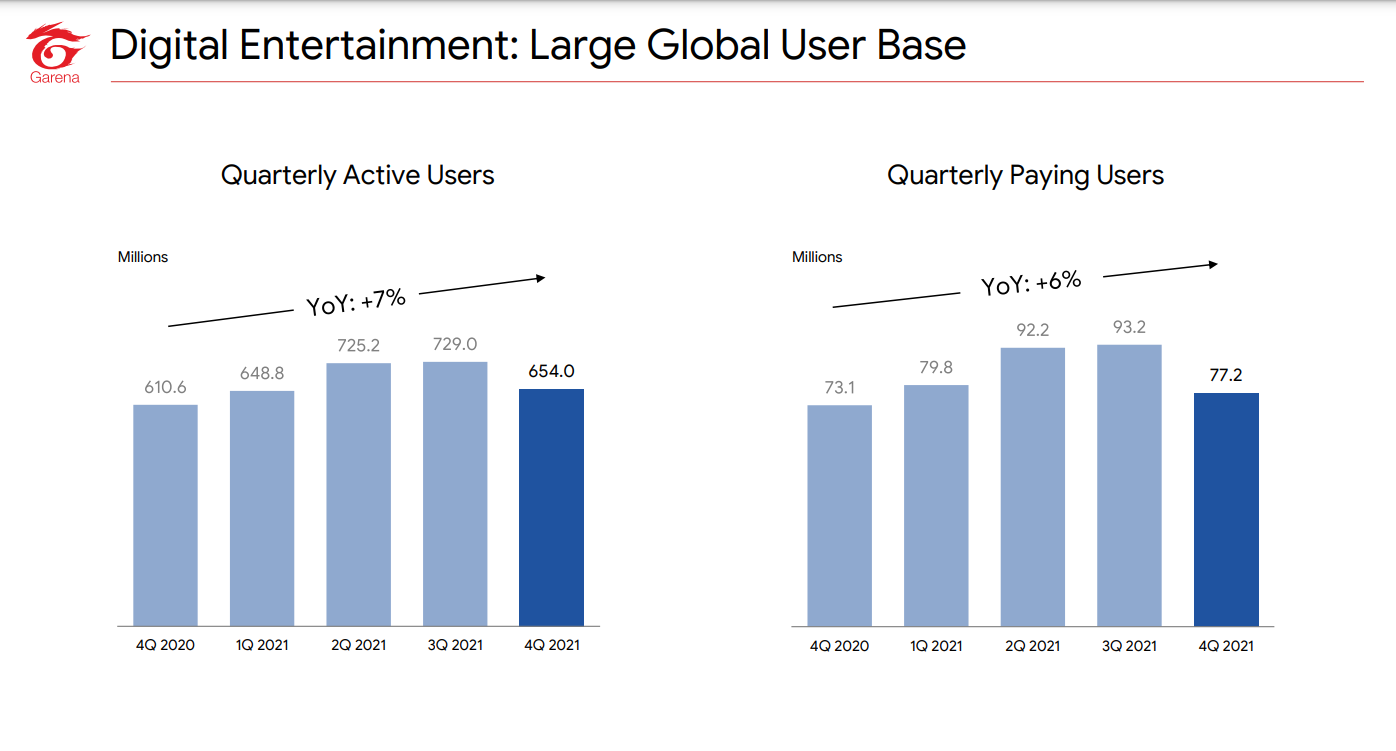Sea Limited has seen its value tumble since last year amid a chain of setbacks. If you’re wondering what you can do before a stock crashes, read on.
Recently, news of Sea Limited’s stock crash sent shock waves around the world.
The Singapore-based tech giant, which owns mobile gaming company Garena and e-commerce platform Shopee, saw its value plunge by US$150 billion (S$204 billion) after a series of setbacks.

At its peak, Sea was trading at US$367 per share in November 2021. However, a dismal quarterly earnings report prompted a sell-off from its investors, including the firm’s biggest investor, Tencent. The Chinese gaming and social media giant sold 14.5 million shares in Sea in January this year, reducing its shares from 21.3% to 18.7%.
The company suffered another blow in February this year as India banned Free Fire, Sea’s most popular mobile gaming app. After the ban, Sea’s value plunged by US$16 billion in a single day.
Another poor quarterly earnings in March culminated in a disastrous five months, which saw the firm losing three-quarters of its value and its share falling to around US$89 per share. (at the time of writing, Sea is trading at around US$108 per share)
As such, you might be wondering what you can do as an investor before a stock crashes. While no one can predict the stock market, you can look out for the quarterly earnings report to help you to spot signals of an impending stock crash.
Start managing and saving money like a pro with SingSaver’s weekly financial roundups! We dole out easy-to-follow money-saving tips, the latest financial trends and the hottest promotions every week, right into your inbox. This is one mailer you don’t want to miss.
Sign up today to receive our exclusive free investing guide for beginners!
What is a quarterly earnings report?
A company’s quarterly earnings report is one of the key indicators of evaluating a company’s financial health.
Released every three months, a quarterly earnings report provides a quarterly update on three key financial statements: the balance sheet, income statement, and cash flow statement.
Together, they provide you with an overview of the company’s net sales, net income, and earnings per share (EPS).
Of the three, EPS is the most important because it tells you how profitable a company is based on each share of its stock. A high EPS tells you that a company is more profitable and has more profits to distribute to its shareholders. EPS is calculated by dividing the net income by the total number of outstanding shares.
By comparing past earning reports, you get a better picture of how a company is doing each quarter and year.
But that’s not all; before a company releases its earnings, financial analysts will make their own forecasts to gauge a company’s performance and growth based on information they have about the company, a country’s economic growth rate, and macroeconomic factors.
As such, some investors compare a company’s earnings report with analysts’ estimates to get a better understanding of whether the stock is worth investing in.
If the quarterly results manage to beat analysts’ estimates, chances are its share prices will go up. Conversely, if they miss analysts’ expectations, then their share prices may fall. That’s why it’s typical for stock prices to fluctuate wildly when the quarterly earnings report is released.
That said, it’s also common for analysts to revise their forecasts after a company releases its earnings.
Besides providing a broad overview of a company’s performance, a quarterly earnings report also gives investors an insight into the performance of business units within a company.
Why was Sea’s stock falling?
Despite reporting a 128% increase in revenue from FY2020 to US$10 billion in its fourth quarter and full-year 2021 report in March, Sea’s stock price crashed by 13% on the day the earnings were released. However, this shouldn’t come as a surprise when you zoom into the results.
For starters, although there has been a growth in revenue, Sea’s net loss widened by 26% to US$2 billion. Loss per share also increased 6.5% from US$2.78 to US$2.96.
What’s more, Sea also lowered its year-on-year bookings (expected revenue from game transactions) for Garena to US$2.9 billion and US$3.1 billion in FY2022, 32% lower than FY2021’s S$4.6 billion.
Despite seeing a 117% year-on-year increase in Q1 2021, bookings have dropped in every quarter since, and are up just 7% year over year in the first quarter.

Garena has been Sea’s only profitable business largely thanks to Free Fire, and Sea has used its profits to fund the growth of Shopee (e-commerce) and SeaMoney (digital payments).
With cash flow set to drop significantly, this could potentially affect the funding of both Shopee and SeaMoney, both of which have been making huge operating losses over the years as a result of aggressive expansions into new markets like Latin America, Europe, and India.

If that’s not enough, Garena has also seen a dwindling user base in Q4 2021. The number of active users in Q4 2021 declined by 10% to 654 million from 724 million in the previous quarter, while quarterly paying users also dropped to 77.2 million from 93.2 million.
To top it all, India’s move to ban Free Fire will likely see further drops in Garena’s user base and revenue if Sea doesn’t address the problem soon.
Not surprisingly, brokers have slashed their target prices for Sea on the back of lower gaming guidance. Maybank Securities analyst, Lai Gene Lih slashed his target price by 56% to US$160, down from US$379. While Citi has lowered its target price from US$241 to US$221, cutting the gross bookings estimates by 34% year on year.
Should you buy, hold, or sell Sea stocks?
If you have a stake in Sea (or if you’re looking to buy the dip), you’re probably wondering what to do next: buy, sell, or hold?
In Sea’s Q4 2021 conference call, the management gave some bittersweet highlights:
- Shopee is expected to grow its revenue by 76% to between US$8.9 billion and US$9.1 billion
- By 2025, cash generated by Shopee and SeaMoney collectively will enable these two businesses to substantially self-fund their own long-term growth
- Bookings for Garena are expected to decline by 35% on average, from US$4.6 billion to between US$2.9 billion and US$3.1 billion in FY2022
- Sea expects less than 40% revenue growth for 2022
All in all, 2022 is set to be a bumpy year ahead for Sea as a result of lower income from Garena and continued expansions for Shopee and SeaMoney, which would likely result in higher losses for the company.
While its stock has undergone a horrible few months, Shopee and SeaMoney are still growing rapidly, and it’s likely that the stock will rebound. What’s more, the stock has a rating of 1.6, and most analysts recommend buying, according to Yahoo! Finance.
However, do bear in mind that analysts can be wrong with their forecasts. It’s important to do your own research and remember to understand your risk appetite and spread your investment to minimise your risk.
What can you do during a crash?
Diversify your investments
One way to minimise your risk is to invest in exchange-traded funds (ETFs) like the S&P 500. With ETFs, you gain exposure to a basket of stocks, instead of putting on your eggs in just one stock. This way, not only will you diversify your risk, but you can also invest in a wide variety of ETFs across different countries, industries, and stock exchanges.
To start investing in ETFs, you will need to open an online brokerage account. Compare and find the best online brokerages on SingSaver now.
You can also invest in bonds. Bonds are considered defensive asset classes as they offer fixed returns and are less volatile compared to other asset classes like stocks. They also help to reduce your portfolio risk.
Government bonds such as the Singapore Savings Bonds (SSBs) and Singapore Government Securities (SGS) Bonds are the safest investments; although they offer lower returns compared to stocks or even other bonds, they offer fixed returns even during times of uncertainty.
Invest in the market
If you've been eyeing a stock, a market crash is a good time to buy the stock at a sale. However, make sure you've done your research on the company before investing. This includes looking at the company's management, the company's financials, and investment returns.
If you're already investing at regular intervals via the dollar-cost-averaging (DCA) strategy, then you're likely going to gain when the market is down. By spreading your investments, you can reduce your risk and also don't have to worry whether the market will be moving higher or lower.
Do nothing
If you're confident with your investment plans and portfolio, then there's no need to panic and sell. After all, market crashes aren't uncommon and you probably anticipated this (or have been through something similar in the past).
During the height of the COVID-19 pandemic, the S&P 500 plunged more than 30% over a short span of time. However, the market bounced back a few months later. Panicked investors who withdrew from the market would have missed out on the gains.
Sell and cut your losses
Of course, it's not always that stocks will bounce back. If they've dropped significantly in value, or if you have good reasons to sell, then cutting your losses could be the best investment decision.
Read these next:
Alibaba, Tencent & Xiaomi: Are Their Stocks The Best Ways To Invest In The Chinese Market?
Guide to Value Investing, and Why You Should Consider Value ETFs
How To Build A Multi-Asset Portfolio Even In Your 20s
Best Brokerage Accounts To Start Your Investment Journey In Singapore
Best US Exchange Traded Funds (ETFs) To Invest In (2021)
Similar articles
What To Make Of The Recent Oil And Gas Stock Sell-Offs
Elon Musk’s US$44 Billion Twitter Bid: What Does This Mean For Twitter And Should Investors Be Worried?
Why Do Singaporeans Keep Buying the Wrong Financial Products?
8 Hottest Stocks From Beauty And Fashion Companies To Invest In Right Now
Sea Limited (SE) Share Price Guide: Is It Worth Buying?
Meta vs Alphabet — A Look At These Tech Giants’ Q1 2022 Earnings Release
Alphabet Stock Split: Is It Good News For Investors?
Netflix Stock Drop: Is Netflix Still A Good Buy?










